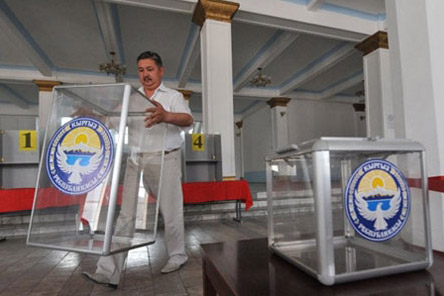Azerbaijan, Baku, Oct. 12 / Trend E.Ostapenko /
Experts believe a minimum gap among the political parties entered into the Kyrgyz parliament fraught with continuing instability in the country and complexity in the formation of coalitions and government.
"The whole parliament will consist of parties that have the support of one third of voters," Russian expert on the CIS Vladimir Zharikhin told Trend. "There is no clear leader, and therefore it will be very difficult to form a government."
Kyrgyzstan held the parliamentary elections on Sunday and 29 parties participated in the elections. According to preliminary results, five parties were able to pass the 5% barrier to form the single-chamber parliament. These are the Ata-Zhurt party with 8.67 percent of the vote and the Social Democratic Party 7.99 percent, the Ar-Namys party with 7.14 percent, the Republic party with 7.04 percent and the Ata Meken party with 5.92 percent.
A situational coalition will be formed on each question arising in the parliament due to such a slight separation of the votes, Deputy Director of the CIS Institute Zharikhin said. Addressing any problems will continue for indefinite period.
Zharikhin considers the likelihood of creating a stable coalition in the parliament among the parties Social Democratic Party, Ar-Namys, Republic and Ata-Meken. The opposition party Ata-Zhurt, combining mostly supporters of the ousted President Kurmanbek Bakiyev may be in the minority, he said.
Kyrgyz Political Analyst Orozbek Moldaliyev expects the political parties' willingness to compromise on the issue of forming coalitions in the parliament, which will then form the government.
"Under the constitution, the president has the right to entrust it to any party in the parliament. The process will take into account the quality of the party leaders," Moldaliyev told Trend over the telephone from Bishkek.
Experts do not see any threat of a split of the country into north and south due to victory of the opposition party Ata-Zhurt ("Fatherland").
"Ata-Zhurt's gaining seats in the parliament, on the contrary, may unite north and south to some extent. If it had not entered in the parliament, then there would be a problem much more serious than they are now," Zharikhin said.
According to the Kyrgyz law, a political party must obtain at least five percent of votes throughout the country and 0.5 percent in each of the seven regions of Kyrgyzstan to pass in the parliament. The five-percent makes up about 141,828 votes.
Almost all parties in the parliament are the parties of northerners. Therefore, Zharikhin said, it would be an ideal to create a coalition of the whole parliament, of course taken into account the interests of Ata-Zhurt, which would mean the country's south. But this would be quite painful and protracted negotiation, he added.
Ata-Zhurt Party Leader Myktybek Abdyldayev served as Attorney General, Interior Minister and Head of Presidential Administration in several periods.
After the elections, Kyrgyzstan becomes the first among Central Asian countries that move to a parliamentary form of government. The parties Ata-Zhurt and Ar-Namys advocate for the restoration of the presidential form of government.
Speaking about the split, European expert Ben Judah said the opposition seats in parliament do not play a key role as Kyrgyzstan is already split between the North and the South.
"The North and the South have two different cultural and political worlds," the member of the research center of the European Council on Foreign Relations (ECFR) in the UK, Judah told Trend.
The South is more religious, non-industrialized and people speak mostly in the Kyrgyz language, he added. The dominant language in the north is Russian, the region is predominantly secular, and it is not surprising that the votes in the parliamentary elections reflected this kind of division within the country.
Well-known Kyrgyz politician Mars Sariyev believes the political struggle in Kyrgyzstan is of clannish nature, but not the struggle of political parties or social programs.
"Unfortunately, there is a polarization on the north-south vector, the clan confrontation. This is a very dangerous trend that could lead to split of the country into two parts," Sariyev said in an interview with Xinhua.
If the clans continue to act only in their own interest ignoring the interests of the country, the so-called "Afghan scenario" is likely to repeat in Kyrgyzstan, Sariyev believes.
"If we recall Kabul of 1950-1960s, it was more westernized city than the entire Central Asia of the same period," Sariyev said. "So, powerful failure in the Middle Ages occurred just because of appearance of the soldiers representing lower strata of the hierarchy of the national tribes in the political front."
"There field commanders merged into crimes, appeared military wings and the country ruled by force of arms, not law," Sariyev said. "The task of the modern elite of Kyrgyzstan is to realize this danger and find common ground."
However, according to Judah, one can speak about presence of economic unions linked to the family and cultural ties in Kyrgyzstan.
"It took Afghanistan 30 years to come to the difficult situation in which it is today," Judah said refuting the possibility of "Afghan scenario" in Kyrgyzstan.
No country in the CIS can boast with mature political parties, Zharikhin said.
"This is our common misfortune, and in this sense, Kyrgyzstan is no better or worse," he said.
Do you have any feedback? Contact our journalist at [email protected]






